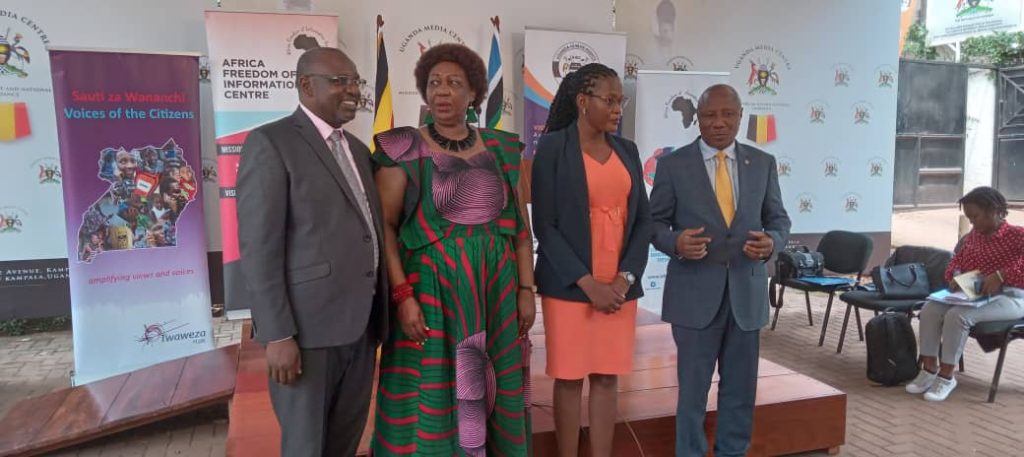
From right is Minister Godfrey Kabbyanga, Nanyanzi Meri, Justice Mariam Wangadya and Gilbert Sendugwa at Uganda Media Centre
By George Bukenya
As Uganda joins the rest of the world to commemorate the International Day for Universal Access to Information, government is yet to amend the Access to information Act to align it with the African Model and International laws regarding access to information.
The Executive Director for African Freedom of Information Centre Gilbert Sendugwa said that, the African Commission on Human and People’s Rights (ACHPR) recommended that Uganda should amend its Access to Information Act (2005) to align with the ACHPR Model Laws regarding access to information.
Sendugwa also said, other recommendations are, to ensure restrictions on freedom of expression are reasonable and justifiable, in line with international human rights standards, protecting journalist from harassment, particularly during politically sensitive periods like elections.
The commemoration of this year’s day will be held at Makerere University on Thursday 26th 2024 under the theme; ‘‘Mainstreaming Access to Information and Participation in the Public Sector.’’
The Minister of State for National Guidance Godfrey Kabbyanga Baluku said that in an effort to improve access to information, government has earmarked development of fibre infrastructures in all districts of the country to enable all citizens access Internet so as to be able get information on a regular basis.
“Government has secured funds from the Exim bank and Word Bank to develop infrastructures for extension of internet to all parts of the country, work expected to commence very soon.’’ Hon Kabbyanga said while addressing the media at Uganda Media Centre in Kampala.
He also said that out of the135 districts in the country, only 53 have been covered with internet fibre infrastructures and the funds secured will help to extend internet fibres to every parish in the country.
According to Kabbyanga, government have resolved to mandate Uganda Telecommunication company Ltd to handle the internet services on its behalf and also attract the private sector to come on board. Although of recent government reduced internet cost for its institutions and agencies from US $ 350 to $ 75, the minister says this can reduce further to become affordable to everyone in the country is infrastructures are fully developed in all areas and with the private sector embracing the service.
Justice Mariam Wangadye chairperson of Uganda Human Rights Commission (UHRC) while addressing the media in the joint press conference with the minister noted that, ‘‘Freedom of Information is a Fundamental human right and the touchstone of all the freedoms to which the United Nations is consecrated’’, as per Resolution59 of UN General Assembly.
She also cited Article 52 of the constitution of the Republic of Uganda, the Uganda Human Rights Commission, as a National Human Rights Institution mandated to monitor government compliance with International Treaties and Conventions it has ratified.
Wangadya also said that this year’s commemoration should be an opportunity to come to the round table with partners together in the protection and promotion of human rights to assess the progress made in the past year and lay strategies on how to overcome the hindrances.
The UHRC boss also commended the speedy information dissemination done by the online media forums thus recommending their streamlining and regulating such that they can operate well under national guidance.
Nanyanzi Meri the senior programs officer at Twaweza said that the recent survey conducted by her organization revealed that the majority of Ugandans are still considering FM Radio as a form of media from where they get vital source of information.
Internet and television still appeals more to the elite and specifically the younger and middle aged people more the urban dwellers according to Nanyanzi. She all said that there’s rising internet usage to the younger people, wealthier, educated and urban cities.